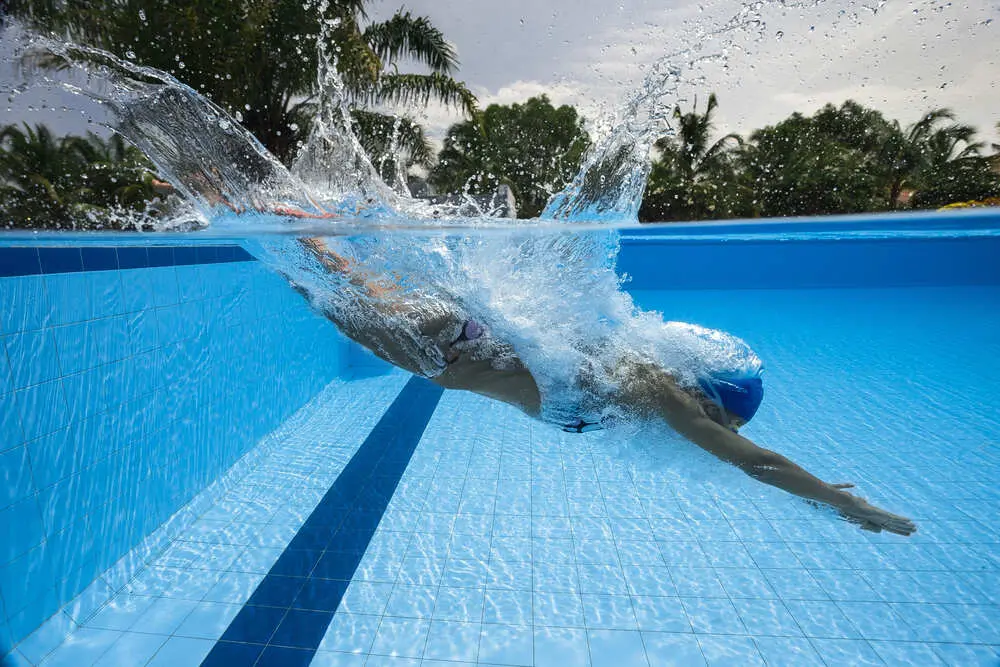The approach to sanitize freshwater pool models differs from that of a saltwater pool, so pool operators must make sure they pick a model that matches their needs
Pool hygiene remains a key topic for pool operators looking for technologies to optimize their processes. In such context, the freshwater pool model has seen saltwater pools grow to be an aspiring contender in terms of potential efficiencies.
Pool water is directly related to available sanitizing models, which have a wider impact on user experience, sustainability and economic costs for operators. All in all, picking the right type of water is an important choice.
Thus, from our experience at generating sustainable, cost-efficient aquatic installations, we share here some keys to help you make this choice throughout this article.
Dive deeper with the eBook
What is a freshwater pool?
Freshwater pool is a designation commonly used within the swimming pool industry. This type of aquatic installation is considered a conventional model, as opposed to saltwater pools — which we will describe below. Contrary to what the name suggests, a freshwater pool is not necessarily a pool that is chemical-free or that doesn’t require chlorine for sanitizing purposes.
From a technical point of view, freshwater is defined by the amount of Total Dissolved Solids (TDS’s) in it. According to the EPA (U.S. Environmental Protection Agency), water with over 500 parts per million cannot be classified as freshwater.
In fact, in order to prevent algae and bacterial growth, chlorine tablets or granules are added to freshwater pools at certain intervals, either manually or through an automated process using dosing systems (typically for commercial or public pools).
Current sanitizing options offer improvements in terms of minimizing the amount of water treatment chemicals that are added to the pool, such as:
- Choosing water treatment systems that use less chemicals and disinfection products and reduce water consumption. These include Heliox UV and Neolysis , based on UV disinfection.
- Prioritizing mechanical water filtration systems instead of intense disinfection processes.
The choice of more eco-friendly pool solutions such as swimming ponds and biopools will also prove beneficial, as these systems are designed to require minimally-invasive water treatments based on natural processes, phosphates and plants.
Saltwater: the alternative to a freshwater pool
As opposed to freshwater pools, saltwater pools require the use of salt chlorinators, also known as salt generators (such as Freepool2, Nature Salt Plus or Easy Salt Next. This equipment employs electrolysis to split the salt into hydrogen and hypochlorous acid (the dissolved form of chlorine). The result is a sanitizing process that doesn’t involve added chlorine and is constant, as opposed to being chlorinated at designed intervals like in freshwater pool models.
A much less chlorine-intensive sanitizing process ensues, with added benefits in terms of user experience : pool scents and the general atmosphere associated with conventional freshwater pools are less intense.
It’s also important to note that while saltwater pools are indeed salty, they only have about 3,000 parts per million (PPM) of salt, a minimized ratio compared to the 35,000 PPM in ocean water.
This lower salt concentration guarantees that bathers don’t experience this water as salty or sticky as that of the seas. On the contrary, pool users tend to generally enjoy this water’s smooth, un-chlorinated texture.

Saltwater vs freshwater pools: the pros and cons
Summing up, the main difference between freshwater and saltwater pools is that these two models employ different chlorination processes.
Generally speaking, the many benefits of saltwater pools in terms of minimized chlorination are rising these systems’ demand. However, it’s crucial to fully understand these systems’ associated advantages and disadvantages and, as a consequence, their suitability.
Pros of saltwater pools
- Less harsh. Saltwater pools allow for the use of natural products instead of chemical disinfectants. This, in turn, translates into a reduction of chlorination and its associated unpleasant effects, such as eye and skin irritation for bathers.
- Less expensive and easier to maintain. Saltwater pools typically require less intensive maintenance operations than freshwater pool models. Water testing and the occasional chemical adjustments are the main maintenance actions for saltwater pools.
- Constant chlorination . Freshwater pools might generate chlorination imbalances. Over-chlorination and under-chlorination can both be a problem, which might then translate into increased irritations for users, algae growth or discoloration. On the contrary, as saltwater pools are chlorinated at a constant rate, it’s more unlikely that sanitation levels go off balance.
- Better user experience . Not only do saltwater pools provide less chances of irritation, but it’s also a generalized opinion that saltwater simply feels better. Saltwater silky textures invite bathers for longer bath sessions and swims, leading to increased satisfaction with the installations.
Cons of saltwater pools
- Higher initial costs. The complexity of a saltwater chlorination system means these systems’ initial costs tend to be higher than freshwater pool models. In any case, pool size greatly determines the prices for this type of system. Providing balance to these higher initial costs is the fact that saltwater pools then generate greater operational efficiencies, including higher water consumption savings. As a result, pool owners tend to benefit from a quick Return of Investment (ROI).
- Corrosiveness. Salt presents corrosive properties that might turn into pool equipment damage. These can, however, be avoided by using salt-friendly pool accessories and furniture, as well as ensuring proper pH and salt levels. The latter can be achieved efficiently by using automatic pH control equipment.
How to pick the right water for your pool
There are many aspects involved in a swimming pool design, among them are sanitizing systems, construction materials and the types of water, as those seen above. Additionally, professional pool designers need to ensure the entire system works as a whole, so that all equipment is integrated.
All in all, expert aquatic engineering and pool designing advice will guarantee pool operators end up with an integrated installation that maximizes efficiencies in terms of costs and sustainability, both in short and long terms.
